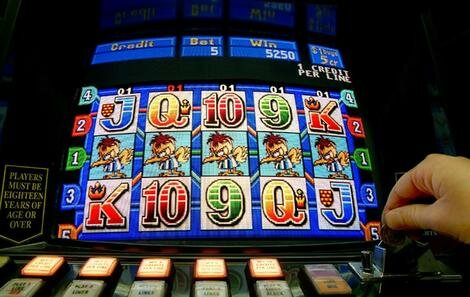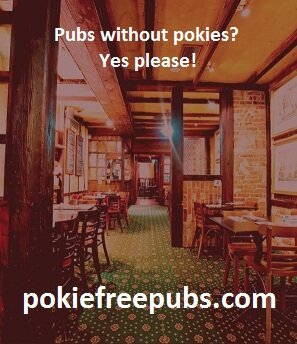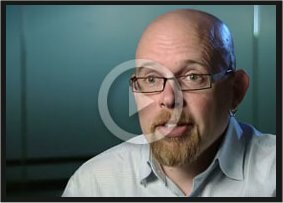I thought I’d made it; I really thought I’d made it. I believed I’d put enough time and space between myself and the person I used to be. I thought I was finally safe.
I was wrong.

January 2014. It had been over thirteen years since I’d last played a poker machine. And believe me when I tell you that was something of a big deal… there had been a time when I would play for hours every day, spending hundreds or thousands of dollars while the world around me faded away. But all that was behind me now.
And for the past three and a half years I’d been on something of a crusade. I’d publicly outed myself as a problem gambler, a recovering poker machine addict. I’d started a blog and written at length about my own problems and the industry in general.
I’d fronted up to Senate committees to talk about my experiences; I was quoted in the official reports they released. I’d published in newspapers and magazines. I’d been on the radio and even on TV, talking about gambling and telling the world in general that I’d beaten the machines, and that there was more, so much more we needed to do as a community to address the wider problems that poker machines bring to society.
In my mind, I was that thing that everyone seems to want and need: a survivor. I’d worked my way through, damaged but intact, and was trying to make a difference. I’d won.
Then came January 2014, and out of the blue my addiction did what addictions do so well.
There was no triggering event in my life that caused it. In recent years I’d been through a divorce, moved house three times until I ended up in a place of my own, kicked cigarettes and got myself in shape physically. There had been some close calls along the way, days when I’d been so low that I craved the comforting numbness of the machines, but I’d made it through unscathed.
I’d turned my career around and was enjoying work for the first time in years. I was making friends, going out, enjoying myself. And I saw my kids every chance I got. Things were looking up.
That all broke on the evening of January 20, 2014. I was writing an article for my blog, about the recent changes affecting poker machine venues in Victoria. One of the changes was the removal of ATMs; I knew that EFTPOS was still being used, and that many pubs and clubs had actually installed EFTPOS cash dispensers, similar to ATMs, to make the experience simpler for gamblers.
I hadn’t actually seen one of these EFTPOS cash dispensers. I hadn’t been into a gaming room to see how they worked. So I decided to do just that.
Now, I’d been into gaming rooms on plenty of occasions in the past few years, alone and in company, for a number of reasons related to my writing, but I’d never been tempted to play. There was no reason to think that this would be any different.
So I got in my car, and drove down the road to the Burvale Hotel. I remember the Burvale the way it used to be, before it became a pokies pub, but it’s a very different place now. I parked around the back, near the entrance to the gaming room, and walked in.
I wandered around for a while, looking at the machines, then went up to the bar and asked how I got money out. I was directed back out into the lobby, where I was joined a moment later by a staff member who put my EFTPOS transaction through. We chatted for a moment, then I went over to the EFTPOS cash dispenser that the staff member pointed out, and collected my money.
I meant to walk out the door and drive home.
Instead, I walked back inside.

Over the next ten days, I came back again and again. It was all I could think about. There was a voice in my head, screaming at me to stop! Walk away! What the hell was I doing? But I couldn’t.
I knew what I was doing. Knew it probably better than anyone else could, but still I kept going back. I’d slipped straight back into the habits I built up when I first started gambling on poker machines, the habits formed and nurtured by the addictive nature of the machines. I knew what they were, knew what they were built to do.
And I let them in.
On the tenth day, it was my youngest daughter’s birthday. I woke up that morning and the full gravity, the full magnitude of what I was doing finally came home to me. Belatedly, the self-control I’d discarded came flooding back and this time, I held firm. I wasn’t going to see my kids until the next day but I was damned if I was going to be a gambler when I did.
That was the end of it. I didn’t know how much money I’d lost but I walked away from it, kissed it goodbye. I turned back to the life I’d made for myself, back to my kids, my house, my job.
But it was different now. I was different. I’d changed. I was no longer the person I’d built myself into, the person with rock-solid defences and a past that stayed in the past. I felt I had betrayed everything I had said and done over the past thirteen years; betrayed my children; betrayed myself.
I was a fraud. A hypocrite. I had failed. I used to count the years since I’d gambled on a poker machine; now I was counting the days.
And I found I couldn’t write any more. Couldn’t talk about it anymore. My blogging dried up, my advocacy for gambling reform faded away. What right did I have to talk about gambling addiction if I couldn’t even take care of my own?
And so, even as my life continued to improve in every other respect, I faded back into silence in this one area that was so important to me. I looked for other things to talk about, other causes to champion, rather than face up to the failure I felt I had become.
But still, I didn’t realise just how deeply I’d been affected by this until recently. When the wakeup call came, it was impossible to ignore.
In my job, I get the opportunity to attend talks and presentations covering a range of topics of social importance. Recently, I listened to a presentation from Pride In Diversity, about LGBTI inclusion in the workplace, and another from Rosie Batty about domestic violence. I also undertook a training session on responding to family violence in the workplace.
On each of these occasions, when the talk turned to secrecy and hiding who we really are, I triggered. Massively. I experienced an irresistible emotional response and sat there, weeping, as the talk went on around me.
The first time it happened, I put it down to an emotional response to an emotional topic, one I firmly believed in. But then came a second time, and a third; something was going on, something deeper.
It became clear to me that there was a part of my life that I wasn’t dealing with, something that had changed… something I was hiding. It didn’t take me long to realise what it was.
And that’s why I’m writing this. It may be that no one ever reads it, that this blog post will sink without a trace. I don’t care. This is my way of standing up and saying “I did this”. This is my way of freeing myself once more from the secrecy that I’d let entrap me.
I’m not going to be quiet any more. I don’t care how much it hurts or how uncomfortable it is; I don’t even care if no one is listening and I end up shouting into the void. The alternative is to shuffle away, to hide and pretend it never happened. And I won’t do that anymore.
Anyone can stumble; anyone can fall. Our strength as people lies in knowing we are all fallible, we are all imperfect, and that we all need help, just to get through every day.
If we slip up, it’s ok. We can get through it. We need to accept that in others; we need to accept it about ourselves. Mistakes don’t make us lesser people; they make us human.
It was only a couple of weeks ago that I finally went back through my finances. In those ten days in January 2014, I lost over $1400 on the machines. You can say it was only ten days, what’s the big deal? I could afford to lose it, no one was harmed, so where’s the problem? Believe me, I tried telling myself that too. But it’s a lie.
I lost more than money; I lost who I was. It took me a year and a half to get that back.



Thanks for sharing this Tom. It’s a braze thing to admit when we have setbacks, even though they happen to all of us at some time in our lives. Glad to have you back blogging again.
oops, I meant brave, not braze 🙂
You are the very person who needs to be involved in gambling reform. The machines are hypnotic devices and the post-hypnotic can kick back in. I would recommend you have hypnosis to terminate that post-hypnotic trance. I would be happy to do it for you for nothing if you live in Melbourne. If you have an email address I could send you my notes of the workshop I gave to the Australian Hypnotherapists Association last year. The notes will enable you to appreciate what happened.
Thank you Tom for your honesty. I am sitting here in tears after I read this & I admire you for being so brave and so honest. I think you have just reminded me to never think that I am 100% safe from the machines & I should be aware that this could happen to me also even tho I hate the machines sooo much with a passion. What an inspiration you are Tom 🙂 I agree with Tim, take him up on the offer please
Well done my friend. It is the secrecy that binds us and makes us feel that we are less than what we are. Keep speaking out and always remember that you are not shouting out into the void. We are here and we are listening.
Thanks for sharing Tom.
Thanks for sharing Tom – such a powerful and important story, reflecting strength and humility. Great to see you are back writing.
Hi Tom, I really feel for you and so brave to write this post. We’re all so glad to have you back shouting , I had worried about you in your absence. I’ve had my setbacks as well and this year has been awful for me. I’d never got to 13 years most I’d managed is two and half years. I hope we’ll keep in touch as your experiences help me and thousands around the world.
Hello Tom:
Let me add a word of encouragement and sincere thanks for your open and frank declaration regarding your personal experience with a very common addiction. You express much wisdom and resolve in your blog entry.
Few people, in my purview, even acknowledge the varied forms of addiction in their lives. Fewer still come to the awareness that all addictions are the means by which humans avoid dealing with the pain of loss and grief that are the result of some “dislocation(s)” in their life. There is a tendency to blame the addiction “means” – drugs, gambling, sex, violence, depression, shopping etc. What those “means” do is provide a short term escape/relief from the deeply held sense of loss one has experienced.
Let me provide the contact information for a very unique Intensive Journal program that has been in existence since the mid-1960’s. A very effective self-help process developed by a psychotherapist and student of Carl Jung. It is a self-directed, compassionate self-inquiry. It is a non-analytical, non diagnostic “method” of processing one’s self-perception and relationship to addictive behaviour that results from of one’s “inner perception” of self and the world.
Best wishes to you in your courageous engagement with the reframing of your life. bi
Dear Tom,
Thanks for telling us what happened.
Poker machines, through the sensory stimulation inherent in their design, alter the neural pathways of our brains. If we are stressed the changes we implement in recovery can easily be sidelined. It is such a hard compulsion to overcome, and I think it does alter the brain in quite a deceptive way.
We can stay abstinent for years through sheer determination and then be overwhelmed by something like reawakened grief or some other trauma. It doesn’t have to be a trauma, either. It can simply be a unperceived change in thinking or an unnoticed descent into some kind of fear or depression.
Sometimes, in my recovery, I’ve had to stay at home because I felt so much at risk. It can be worse if I’m tired or feeling unwell. Sometimes I have just got in the car and driven to the country to put my mind in another, more peaceful place. One day I may not be able to do this.
How do we measure recovery anyway? It should not necessarily be by periods of abstinence but more by quality of thinking and what one does with one’s life. Sometimes things happen by which we learn about ourselves and no-one has the right to judge although people often do. Self-judgment according to the rules of one social template or another is one of the hardest things we have to live with.
As we know, poker machines are insidious in our communities. That is one of the things we need to change. There are many people out there innocently being drawn into the mind changing, money grabbing clutches of these machines right now. I feel for them.
Your blog was one of the respite places for me in 2011. You have affected the lives of many in such positive ways and although we have not met in person I regard you as friend on a common path. Don’t judge yourself too harshly because of this.
Wow. Good on you. Be brave. You are human and not a fraud. Try your best and it won’t beat you. We have all been there in one way, shape or form….
Clearly you’re not whistling in the dark afterall.
I’m happy for you for that, but more so for your epiphany. Those are excellent things indeed.
Don’t have any wisdom, just wanted you to know that I read this, understood it, and I think you’re amazing and wonderful. All love to you my friend. X
Strength, brother.
Hi Tom, I’m the CEO of the Vic Responsible Gambling Foundation and just wanted to thank you for sharing your challenges publicly. Stories such as yours inspire other people with gambling problems to seek support, something that is one of our greatest challenges. Relapse is very common and providing people can recover from it, can be a definitive part of the recovery process as it confirms the nature of the addiction and how powerful it can be. Take that relapse episode as an important part of your recovery and draw strength from the reality that you overcame that also.
Well done Tom
Thanks Serge.
I respect every word! thankyou for sharing this I’m going through hell I need my life back, reading your story is an inspiration. stay strong and keep up the fight.
regards
Patrick
Thank you so much for your article in today’s Age, and now that I’ve found your blog, for that amazing piece of writing
Hi I have just read your story and post and it could be my story
I am on a pit of despair that only Anothet gambler will understand
The mixed emotions guilt feeling stupid despair and depression and self loathing but I have taken the first step
I’m sure that Tom will get back to you but in the meantime, don’t despair.
You’re not alone. Talking to someone helps. In fact, it’s essential Take care.
Kate